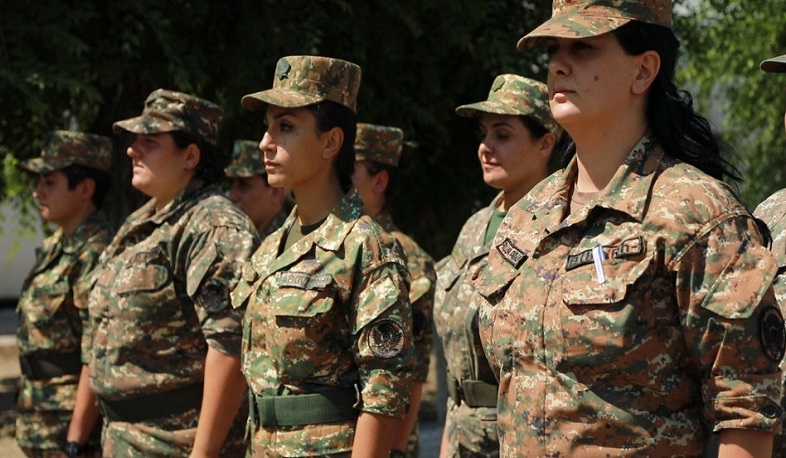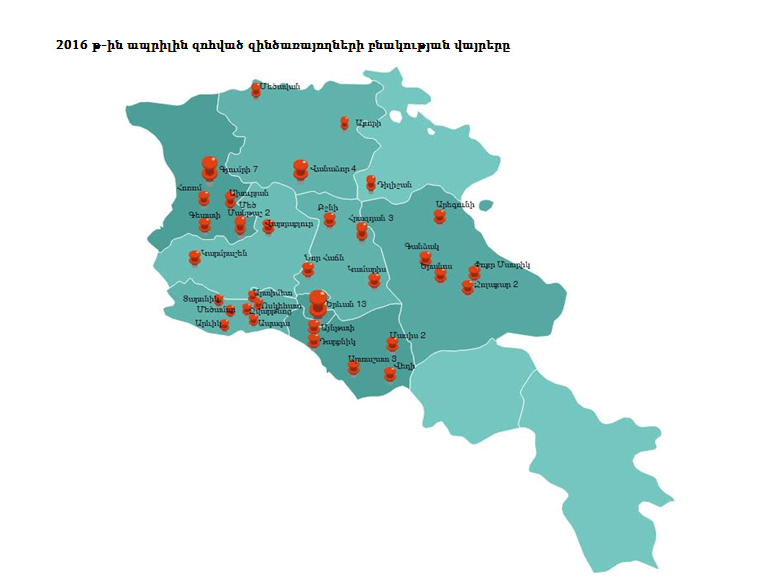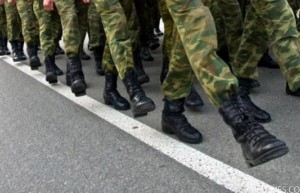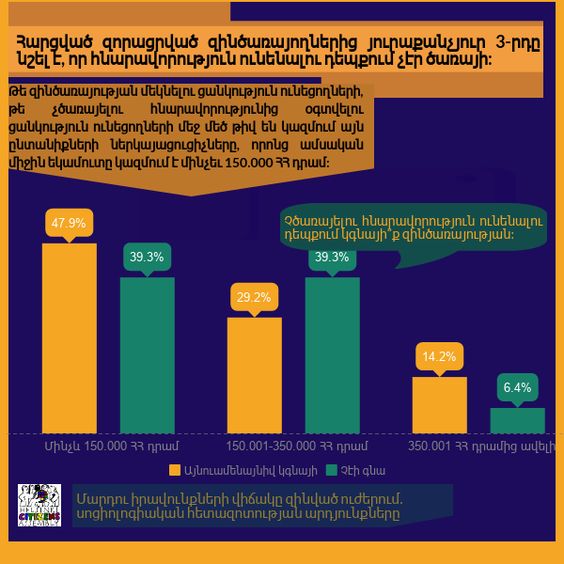In February 2023, the RA Ministry of Defense put into circulation a draft law, according to which females can voluntarily join the military service in the Armed Forces for 6 months. During the Government’s session, the RA Prime Minister mentioned that they have an objective to have new or fresh infrastructure, since this is a new page and we need to launch this process with new content and freshness.
Upon completing the service, women will get a merit pay of 1 million drams. Based on the 6-month service, servicewomen will be entitled to join 5-year military service under the “Homeland defender” program instead of being discharged.
On 21 April 2023, the RA Government decided to approve the draft law and present it to the RA National Assembly.
Noteworthy, Armenia is not the first state to introduce the institute of women’s involvement in the armed forces. Thus, a question arises as to what degree the RA Ministry of Defense and the RA MoD General Staff of the Armed Forces took into account other countries’ practice of engaging women in the armed forces, to what extent the Ministry of Defense took into account the problems inevitably emerging in the frame of organizing women’s service in the armed forces, and to what extent they are ready to control issues and risks related to women’s military service.We have no information in this regard, they have not shared any approach for us to understand whether the RA Armed Forces have the necessary institutional, legal, logistic accommodations, changes, whether the appropriate educational programs were introduced to ensure conditions for women’s decent service in the Armed Forces.
Taking into account the importance of the issue, we hereby present different countries’ experience in engaging women in the armed forces, the problems that emerged and solution mechanisms, which will indicate the challenges we will inevitably face during the process of engaging women in the Armed Forces.
We used the Handbook on Human Rights and Fundamental Freedoms of Armed Forces Personnel published by OSCE Office for Democratic Institutions and Human Rights in 2008 as an information source presenting the experience of different countries.
According to the handbook, in spite of the fact that women are de jure allowed to serve in armed forces in most countries, they still face de facto discrimination on the basis of gender. Women mainly do not hold high-ranking positions in the armed forces. As a consequence, servicewomen feel that they must work twice as hard to receive the same respect as men.
According to the handbook, Sexual assaults and sexual violence against female military personnel is also a widespread problem. In the United Kingdom, for example, according to a public survey recently conducted by the Ministry of Defence and the Equal Opportunities Commission, nearly all servicewomen, while showing high tolerance for such behaviour, had heard sexual jokes and stories and had been exposed to sexual language and material in the workplace. Fifteen per cent had “particularly upsetting” experiences, and 4 per cent said they had been sexually assaulted. In the United States, the Department of Defense acknowledged 2,374 reported cases of sexual assault in 2005. This represents an increase of 40 per cent over the number of reported cases in 2004 (1,700). The data for 2004 represents a 25 per cent increase over the 2003 figure (1,012). The data for 2003 represents a 41 per cent increase over data collected for 2002. Among women veterans seeking disability benefits, 69 per cent of combat veterans and 86 per cent of non-combat veterans reported in-service or post-service sexual assault.
Some states, after extensive research into the nature and the extent of sexual harassment in the armed forces, have decided to take special actions in order to deal more effectively with the problem. This is the case in Denmark, for example, where in 2003, following the survey report of Psychologists at the Defence College, the Danish Defence Command adopted various initiatives to prevent and combat harassment, such as the establishment of a hotline for psychological counselling and the establishment of an organization of local counsellors. The role of the counsellors has now been widely accepted locally, and both peers and management have started using them actively in handling conflicts. Furthermore, in January 2006, the Danish Armed Forces instituted special rules and regulations that make certain actions sanctionable. However, this did not mitigate the situation, since it highlighted not the elimination of the issue, but mitigation of the consequences.. This is indicated also by the “Women Speak about Abusive Behaviours in the Armed Forces” article published in euromil.org, where former and current servicewomen speak about the harassment they were subjected to during their service in the armed forces.
Below are the OSCE manual recommendations based on positive and negative experience of different countries in terms of engaging women in the armed forces.
• Based on managing diversity and gender mainstreaming, legislation on equal opportunities should be implemented in the military sector;
• Armed forces personnel should be recruited and selected for positions in the armed forces on the basis of actual, not presumed, capabilities;
• Officers should be provided with adequate training, including on culture, gender, and complaints procedures;
• Commanders should use their position to prevent and punish cases of mistreatment;
• Commanders should promote a culture of mutual trust and respect;
• There should be no tolerance of sexual harassment or sexual violence in the military. An effective system of sanctions should be provided for in case of harassment or violence;
• In training, armed forces personnel should be made aware of what behaviour constitutes harassment;
• Complaints mechanisms should be available for women service personnel who have been subject to harassment or violence;
• Special advisors for women should be established in the armed forces;
• A better understanding of the benefits women bring to the military should be promoted;
• Armed forces should use positive advertising to recruit women;
• States should improve and enhance the military’s ability to recruit, retain, and advance
By resolution 2120 “Women in the armed forces: promoting equality, putting an end to gender-based violence”, PACE calls on Council of Europe member states:
with regard to recruitment and career management for members of the armed forces, to:
• adapt recruitment strategies so as to eliminate stereotypes and attract more women into the armed forces, including for military duties;
• place an emphasis in recruitment and career management policies on identifying the skills needed to fulfill the missions that are assigned to today’s armed forces;
• open all positions in all corps of the armed forces to women;
• put in place proactive policies for recruiting women and including them in roles from which they have previously been excluded; look at the physical criteria applied in recruitment to these professions and the advisability of running pilot projects to promote the recruitment of women in these professions;
• work actively to promote the deployment of women in foreign operations, including in military roles; include gender advisors in each foreign operation by an armed force, at all stages of preparation and deployment;
• develop more flexible career opportunities in order to increase the number of pathways providing access to the most senior ranks;
• introduce comprehensive and consistent measures to help balance work and private life for all members of the armed forces;
• systematically incorporate the gender dimension in all deliberations on the introduction, continuation or abolition of military service;
• carry out research into the reasons for the difficulties encountered in recruiting greater numbers of women for military duties, the reasons why the military careers of women are often shorter than those of their male counterparts and the reasons why women and men leave the armed forces before retirement age or the end of their contracts;
with regard to the creation of a climate more conducive to gender equality within the armed forces, to:
• make an active commitment at all levels of the chain of command to change mentalities and the internal culture in the armed forces so that all differences are positively accepted and turned to account;
• include teaching on the gender dimension in all stages of military training and make sure that both women and men teach in military academies;
• include gender advisors in all bodies so that gender is taken into account systematically and as an integral part of everyday work;
• establish and support the functioning of networks of military women;
• ensure that equipment and uniforms are suitable for women’s bodies and that living quarters are adapted for accommodating both men and women;
with regard to combating gender-based violence in the armed forces, to:
• ensure that the legislation applicable to members of the armed forces, including the criminal law where appropriate, explicitly prohibits all forms of gender-based violence and is both comprehensive and effectively implemented; also ensure that internal codes of conduct include strict provisions in this connection, which are widely known and applied at all levels;
• adopt and ensure the systematic application of a zero-tolerance policy vis-à-vis gender-based violence and send the message to all military personnel that such behaviour will not be accepted in the armed forces;
• make all levels in the chain of command aware of the need for such a policy;
• establish mechanisms, for instance free hotlines, to enable victims to make informal complaints confidentially and anonymously and obtain impartial advice about their situation;
• facilitate access by victims to formal complaint mechanisms and set up whistle-blowing mechanisms independent of the chain of command to which victims belong;
• provide assistance and support to victims when they report abuse;
• define effective penalties and apply them to the perpetrators of violence, as simply transferring the victim of a sexual assault is not an appropriate response;
• sign and/or ratify, if they have not yet done so, the Council of Europe Convention on Preventing and Combating Violence against Women and Domestic Violence.
A question arises whether the RA Government and the Ministry of Defense have implemented the steps and activities listed above, and have ensured the listed conditions before making the political decision of involving women in the armed forces. Ultimately, are the RA Armed Forces appropriately prepared to involve women in military service? Otherwise, it would be grounded to claim that by involving women, the Armed Forces solve the issue of the number of servicepersons.




